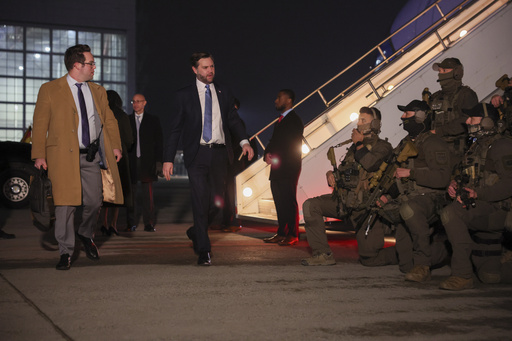
The situation in Ukraine remains precarious as U.S. officials travel to Saudi Arabia to initiate direct discussions with Moscow aimed at finding a resolution to the ongoing conflict, leaving Kyiv and its European partners urgently seeking a security strategy.
France convened an urgent gathering of European leaders in Paris after their initial interaction with Trump’s team during the Munich Security Conference over the weekend, leaving many European officials shocked. Senior U.S. representatives, including Vice President JD Vance, criticized European countries, delivered ambiguous messages regarding support for Ukraine, and indicated that Europe would not be involved in the negotiations concerning Ukraine.
Ukrainian President Volodymyr Zelenskyy asserted that Ukraine would reject any agreements made without its consent and dismissed a U.S. offer for access to its rare earth minerals, deeming it overly beneficial to American interests without providing any solid security assurances.
European officials are beginning their week meeting in Paris, while Zelenskyy is on a diplomatic mission in the United Arab Emirates. At the same time, U.S. Secretary of State Marco Rubio is preparing for discussions with Russian Foreign Minister Sergey Lavrov in Saudi Arabia, marking the first high-level U.S.-Russia meeting since the onset of the invasion nearly three years ago.
In the aftermath of a chaotic weekend in Munich, the balance of post-World War II order and the positioning of key players in negotiations regarding Ukraine have changed significantly.
In the United States, Vance’s speech at the Munich Conference criticized European leaders for what he termed a retreat from shared values, highlighting issues such as uncontrolled migration and limitations on free speech. He insinuated that the real dangers facing Europe stem from internal issues rather than threats from external powers like China or Russia. Meanwhile, General Keith Kellogg, Trump’s special envoy for Ukraine and Russia, largely sidelined European nations from Ukraine-Russia discussions, despite Zelenskyy’s appeals for their involvement. Trump officials also emphasized that they expect European countries to contribute to Ukraine’s future security without clarifying the role the U.S. might play.
Rubio’s arrival in Saudi Arabia on Monday precedes his meeting with Russian officials scheduled for Tuesday, driven by Trump’s directive for his team to conclude the conflict and prepare for a summit with Russian President Vladimir Putin.
In Ukraine, although Zelenskyy begins his week in the United Arab Emirates, the country is not participating in the Saudi talks, although a Ukrainian delegation is present for a business conference. Zelenskyy has made it clear that Ukraine will not entertain any agreements reached between Moscow and Washington without its participation, advocating the establishment of an “armed forces of Europe,” as he questions the reliability of U.S. support for European nations. He envisions a military coalition that allows Ukraine to have autonomy in decision-making without U.S. influence, though the feasibility of this concept is debatable.
Despite a senior Ukrainian official describing a meeting between Zelenskyy and Vice President JS Vance as productive, Zelenskyy instructed his representatives to reject a U.S. proposal regarding access to Ukraine’s rare earth minerals due to its emphasis on U.S. benefits without concrete security guarantees. The White House responded by asserting that Zelenskyy’s decision was “short-sighted,” suggesting he was passing on a valuable opportunity from the Trump administration.
In Europe, leaders are grappling with the challenging rhetoric and mixed messages from the Trump administration concerning democracy and the ongoing situation in Ukraine. German Chancellor Olaf Scholz pushed back against U.S. involvement in German political matters after Vance criticized Europe’s democratic practices and met with a far-right German politician. Germany’s Foreign Minister Annalena Baerbock characterized the coming week as “an existential moment” for Europe, emphasizing the necessity for the continent to assert its position.
In a significant move, U.K. Prime Minister Keir Starmer has become one of the first European leaders to publicly contemplate sending forces to Ukraine if a peace agreement is reached, even if such actions may expose them to risks.
On the Russian front, Moscow appears to be warming up to the current U.S. administration. The recent phone call between Trump and Putin sent ripples through Europe, and Vance’s critical address at the Munich Conference was welcomed in Moscow. The Russian newspaper Moskovsky Komsomolets remarked that Europe had been “taken down a peg or two,” rendering it “dumbfounded” by the turn of events.
While it remains uncertain whether Putin is genuinely inclined to end the war, the Kremlin has announced that Lavrov and other high-ranking officials will attend negotiations in Saudi Arabia with Trump’s team. Topics on the agenda will likely include reinstating relations, the situation in Ukraine, and a potential meeting, as Putin has already extended an invitation to Trump to visit Moscow, suggesting May as a possible timeframe.
The Moskovsky Komsomolets humorously speculated about the implications of the Trump-Putin conversation, playfully stating, “Trump called Putin. It went like this: ‘Vladimir you’ve got a cool country, and I have a cool country. Shall we go and divide up the world?’”

